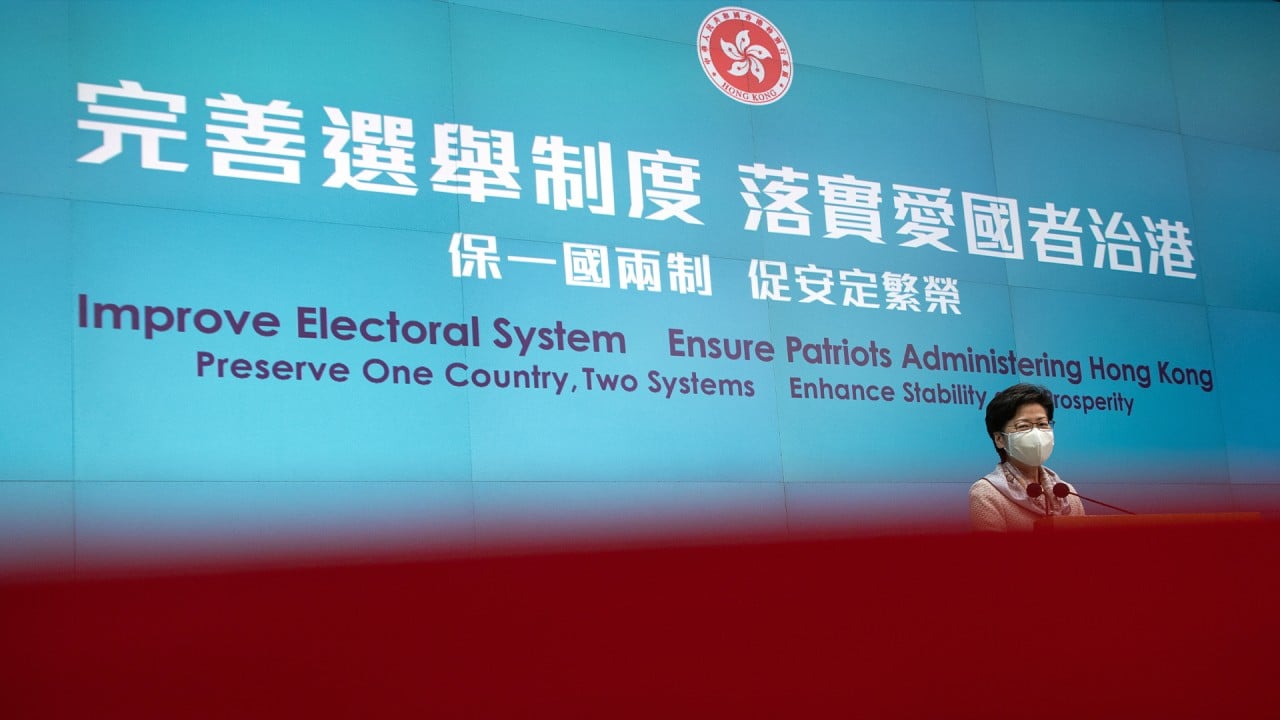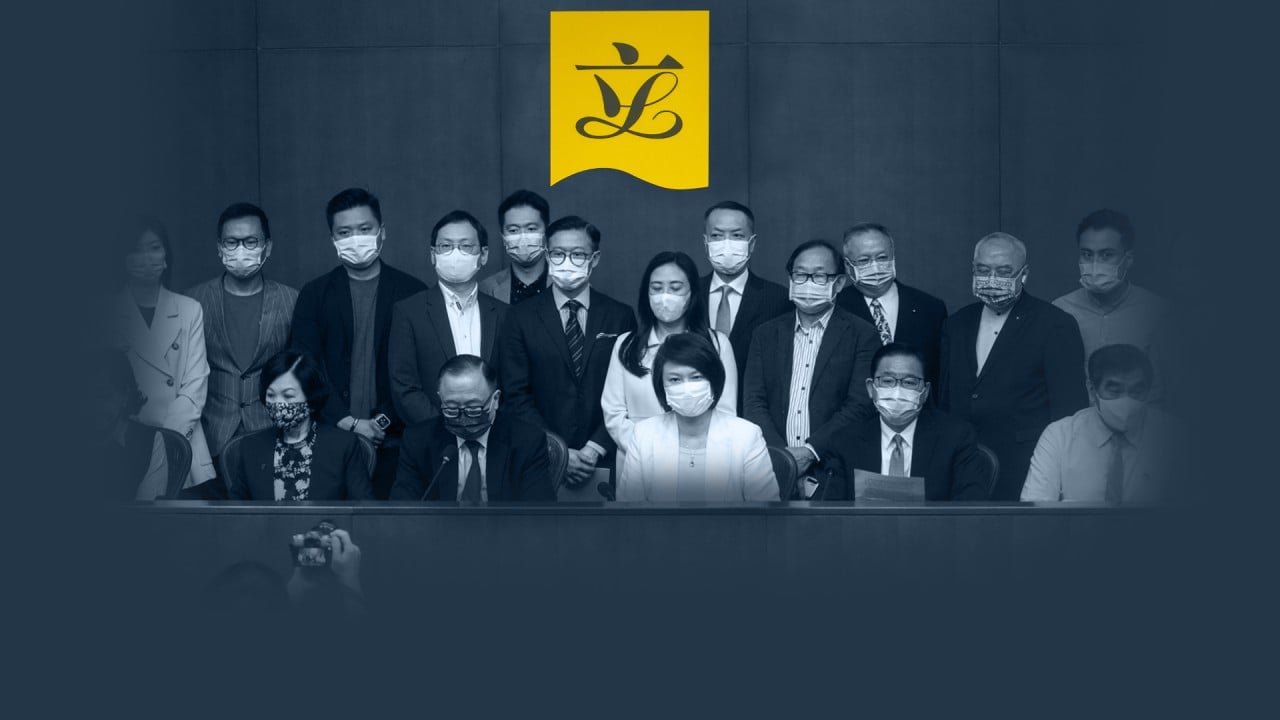
Goodbye district councils? Hong Kong’s area committees set to replace local bodies reeling from wave of resignations
- Government-appointed area, crime-fighting and fire safety committees step up, seeking more power, funding
- Some district councils left with too few elected members to continue functioning effectively
Twenty months after losing the district council seat he held for eight years, Hong Kong pro-establishment politician Lau Chee-sing is back, and riding high.
Not only has he been made chairman of the new Area Committee in Tai Po North, but the appointment also makes him eligible to be part of the powerful Election Committee that will pick Hong Kong’s leader next year.
In April, the Home Affairs Bureau created two new area committees in Tai Po, appointing Lau, 63, an engineer and veteran of the pro-Beijing New Territories Association of Societies, and 36 others to form the new local groups.
The government’s preference for his group, compared with the elected – and opposition-controlled — district council, was evident when his committee visited Lung Mei Beach, a 200-metre stretch of artificial beach, before it opened last month.
Hong Kong’s district councils: with opposition resigning in droves, what happens next?
Lau and his team were accompanied by officials from three government departments. To ease traffic congestion, he got together with representatives of six rural villages to suggest new ferry routes to the beach.
“I don’t see the need to make suggestions via the district council,” he said. “I have the engineering expertise and all the connections with officials needed to get the job done.”
Clearly, fortunes have changed in the arena of local Hong Kong politics since November 2019, when opposition candidates swept to power in district council elections, taking charge of 17 of the city’s 18 councils.

But their moves have hollowed out district councils, leaving many without chairmen, or with too few members to continue running effectively.
Stepping in to fill the void are three relatively low-profile committees made up mainly of community leaders appointed by the government – the area committees as well as the district crime-fighting and district fire safety committees.
These groups are now seeking the power and funding to shadow or replace the depleted district councils. Unlike district councillors, who are elected and receive monthly wages of HK$32,150 (US$4,100), the committee members are volunteers.

02:34
China’s top legislative body passes sweeping Hong Kong electoral reforms
Area committees were formed in 16 districts in 1972 primarily to promote public participation in the Keep Hong Kong Clean and Fight Violent Crime campaigns. There are now 71 committees in the 18 districts, tasked with encouraging public participation in district affairs and helping to organise community activities and government campaigns.
Despite his defeat in the 2019 polls, Lau kept his office, using his own money and donations from residents to continue serving the neighbourhood.
The resignation of eight pro-democracy councillors from the 21-member Tai Po District Council has given him the opportunity to step up again through the area committee.
“We can do much more to serve residents at this critical time,” he said, calling for the committee to be given powers to allocate government funds and access policy papers.
‘Committees need more funds to do more’
Instead, 156 seats have been set aside for members of the area, crime-fighting and fire safety committees.
According to a count by the Post, the three committees have more than 2,500 members and about 200 of them are candidates who lost in the 2019 district polls.

05:10
Hong Kong's revamped electoral system bolsters pro-Beijing influence in key decision-making bodies
Kwun Tong district councillor Frankie Ngan Man-yu, 34, of the pro-government Democratic Alliance for the Betterment and Progress of Hong Kong (DAB), sits on the District Fight Crime Committee there.
It is allocated tens of thousands of dollars a year for community projects, but he said it had insufficient resources to do more.
“The annual funds are only enough for us to organise anti-crime events targeting one specific group each year,” he said. “With more resources, we can commission in-depth studies and hold events to benefit more residents.”
A major function of district councils is to scrutinise funding for minor works and community activities, but they also have budgets for various activities.
New BN(O) passport rule for members of Hong Kong’s powerful election body
For the 2020-21 financial year, HK$461.6 million has been provided for district councils to carry out community involvement projects and activities.
Since last year, the government also earmarked HK$80 million as annual recurrent expenditure for a “District-led Action Scheme” to tackle long-standing local issues.
The government-appointed committees now want more funds and power, along with their rising fortunes.
But Sam Yip Kam-lung, 33, who resigned earlier this month as an opposition member of Central and Western District Council, questioned if taxpayer money would be spent properly by appointed, pro-government committees.

He said that at a council meeting last month, members of the area committee wanted HK$100,000 to organise a photography competition, budgeting HK$5,000 merely to launch Facebook and Instagram pages, the same amount to run a Google form, and HK$3,000 to operate an email account.
“They explained those were rough estimates, but our jaws dropped when we read the documents,” he said. The opposition-controlled council rejected a large part of the committee’s proposed budget.
He said there were documents which also showed the same committee sought HK$100,000 to host a night show to celebrate National Day in 2019, and HK$120,000 to organise guided tours and produce leaflets about the history of the district.
Uncertainty ahead for district councils hit by arrests, resignations
“If these people are empowered to allocate funds, public money might just go into the pockets of companies affiliated to them. It’s hard to guarantee that public money will be well spent.”
Hard to reach committee members
Beijing and city officials have not indicated clearly what lies ahead for district administration.
When asked in a media interview earlier this month how residents should raise their grievances with so many councillors gone, Chief Secretary John Lee Ka-chiu replied that they could turn to their local area, crime-fighting and fire committees.

Chief Executive Carrie Lam Cheng Yuet-ngor had earlier said the three committees were representative, and pointed out that two had been around longer than district councils.
But access to most members of these committees remains difficult.
While district councillors have their office address and contact details listed online, only the membership list for the area committees is available on the Home Affairs Department website.
Residents can hardly tell who to contact, much less how or where to reach them. The agenda and minutes of the committees’ quarterly meetings are also not available to the public, unlike those of district councils.
Hong Kong leader shrugs off residents leaving, says city has ‘prosperous future’
“I’ve never heard of any of the Area Committee members doing that,” she said.
Half the members of the 42-member council have resigned. With 600,000 residents in the district, Wong said it would be impossible for the remaining councillors to shoulder all the work.
She called for greater clarity from the government on what lay ahead and the changes afoot, saying the disarray was jeopardising residents’ interests.

“It’s understandable that the unpaid district representatives refuse to share their contact information with the public,” she said. “[But] if there is no reform, it is the residents who will suffer.”
The Central and Western District Council has been hardest hit by resignations, with just three of its 15 members still in office.
Liberal Party member Jeremy Young Chit-on, the only one remaining from the pro-establishment bloc, is worried the council had been crippled, and said some meetings had already been cancelled, as the acting chairman found the situation “chaotic”.
“I don‘t even know how we can raise motions and vote on them with only three people left,” he said. “It would be better if the government can explain the future of district councils.”
The government’s reticence on the fate of district councils has been conspicuous.
She said it would be up to the next chief executive to decide if he or she wanted to hold by-elections in the remaining 18 months before the 2023 polls.
The DAB’s Frankie Ngan also wants to know if the roles of the government-appointed committees, as well as the mutual aid and owners’ committees, will be reformed to fill the vacuum in the meantime.
Number of eligible voters for Hong Kong Election Committee polls plunges
Political scientist Ivan Choy Chi-keung, from Chinese University, cautioned against empowering government-appointed district representatives and asking them to replace district councillors.
“It’s hardly convincing to let a group of election losers ‘reflect’ citizens’ views, after publicly elected councillors were forced out,” he said, urging the authorities to reflect on the true meaning of “district administration”.
The Home Affairs Department did not respond when asked if the government intended to hand more power to the local committees. A spokeswoman highlighted the present functions of the area committees.
She also refused to reveal the contacts or background information of area committee members across Hong Kong.

05:45
Hong Kong’s pro-Beijing camp reeling after crushing defeat in district council elections
Asked if there were plans to reform the councils, she said: “Relevant district councils will continue to handle district affairs as usual, and citizens can contact relevant government departments for district affairs if necessary.”
For now, the fate of the district councils remains uncertain, even over whether they would continue to be part of the political landscape after 2023 when their current term runs out.
Song Sio-chong, a professor at Shenzhen University’s Centre for Basic Laws of Hong Kong and Macau, was not too worried. He said he believed that area committees would only shadow the hollowed-out district councils until the 2023 polls.
Beijing still had “plenty of time” in the next two years, he said, to observe the potential impact on district affairs before making a decision.
He added: “As long as problematic councillors are weeded out, and Beijing draws a line on what acts are not allowed, I don’t see why the next district polls can’t proceed,”
Additional reporting by Lilian Cheng

